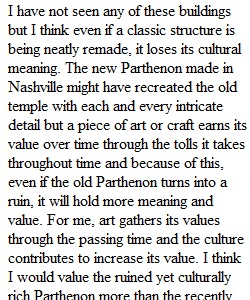


Q This week, we talked about architecture and our ability—in cases like the Parthenon re-creation in Nashville—to visit reconstructions of famous structures. For this assignment, discuss the phenomenon of reconstructions by focusing on the Parthenon in Nashville. Here is a link to the Nashville.gov website: The Parthenon. If you were to visit the Nashville Parthenon, what is it that you are actually seeing, in relation to the original? What is carried over, and what is lost? What can never be translated, and what is successfully communicated (if anything)? Why would somebody want to re-create the Parthenon? For this question, please consider the following: • Compare the original setting/context (physical as well as cultural) in Athens versus the new setting in Nashville. How does the setting affect our understanding of a place? Can you think of a musical example where this is the case? • Consider the fact that one building was constructed more than 2000 years ago and the other is quite recent. • Think about the type of viewer who would have seen the Parthenon originally, versus us, today. How does the "meaning" of a building that is even "identical" to another building change simply because of what viewers are bringing to this? You could take this a step further and ask yourself whether the Parthenon on the Acropolis in Athens today is the same Parthenon seen by the ancient Greeks (even if it were accurately reconstructed, and not in ruins). Again, taking the viewer into account, what has changed? What can never be preserved? Is there anything that carries over? Again, you may find that your experience in music can help you to answer this question. Your post should be two to three (well-developed) paragraphs long.
View Related Questions